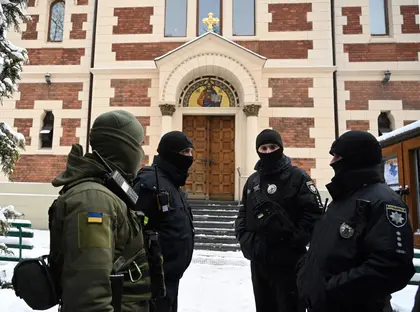Ukraine's SBU security service on Wednesday found "propaganda literature" in counter-intelligence searches in churches and monasteries across the country, in its most recent descent on religious sites of the Russia-linked Ukrainian Orthodox Church.
JOIN US ON TELEGRAM
Follow our coverage of the war on the @Kyivpost_official.
"The Security Service of Ukraine found Russian passports, propaganda literature and laissez-passer" issued by Russian occupation authorities during searches on Wednesday, the agency said in a statement.
The SBU earlier announced "counter-intelligence measures" in more than a dozen religious sites in several Ukrainian regions, including the western Lviv region, Kherson region in the south and Zhytomyr region in the northwest.
"In the publications, representatives of the Russian Federation deny the existence of the Ukrainian people, their language and culture, and question Ukrainian statehood," the SBU said.
It published photos of seized Russian passports, Saint George ribbons -- Russian military symbols widely taken up by supporters of the war -- and documents in support of Moscow.
Earlier this month, President Volodymyr Zelensky said Ukraine will move to impose limitations on religious organisations in the country which have links to Russia.
Ukraine had been under Moscow's spiritual leadership since at least the 17th century, but part of the Ukrainian Orthodox Church broke with Moscow in 2019 over Russia's annexation of Crimea and support for separatists in the eastern Donbas region.

Pope Francis Chooses Ukrainian Catholic Bishop to Become Cardinal
In May, the war caused the Moscow-backed branch of Ukraine's Orthodox Church to sever ties with Russia, in a historic move against the Russian spiritual authorities.
Earlier on Wednesday the SBU said it was carrying out measures aiming to "prevent the use of religious communities as a centre of the 'Russian world' and to protect the population from provocations and terrorist acts".
It released photos of its operatives in khaki uniform inspecting religious sites, sometimes accompanied by priests in long black robes.
You can also highlight the text and press Ctrl + Enter






